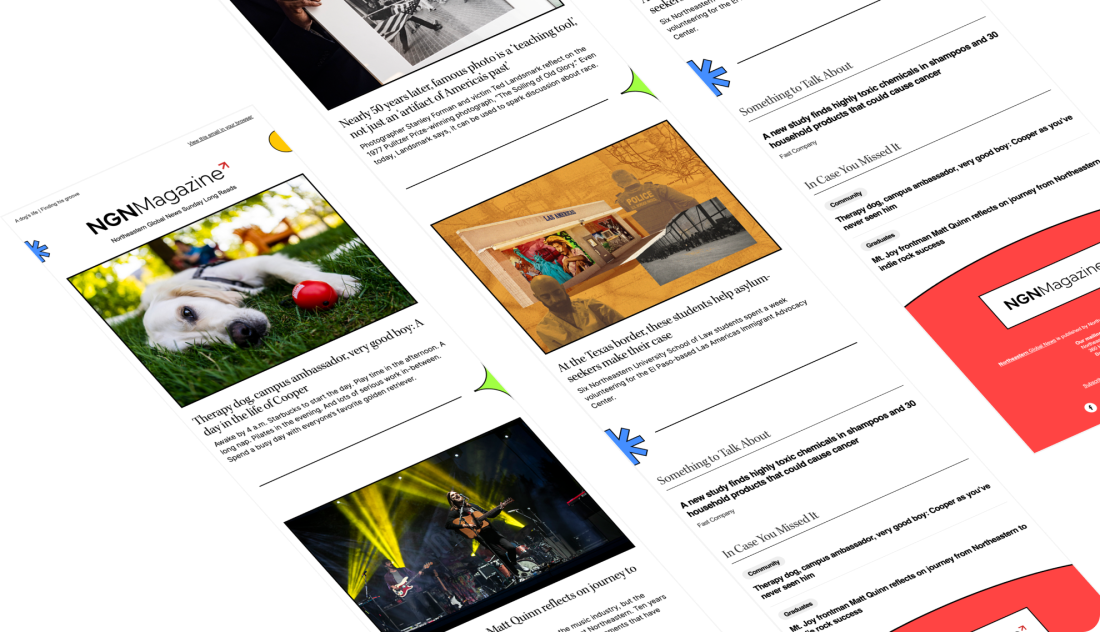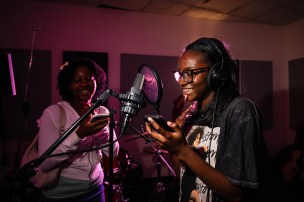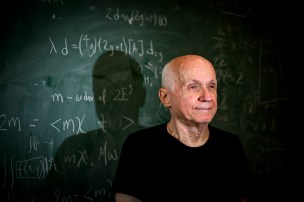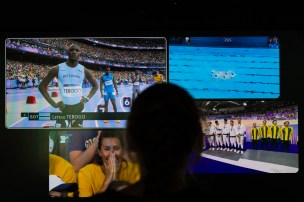Published on
Behind the scenes in NBC’s Olympics research room: ‘Gold Zone,’ obscure badminton rules and trivia for Peyton Manning
Northeastern University data science graduate Claire Dudley has spent the past three weeks in NBC’s Connecticut compound unearthing statistics and stories for the Paris broadcasts. Here’s a peek at her time on the job.
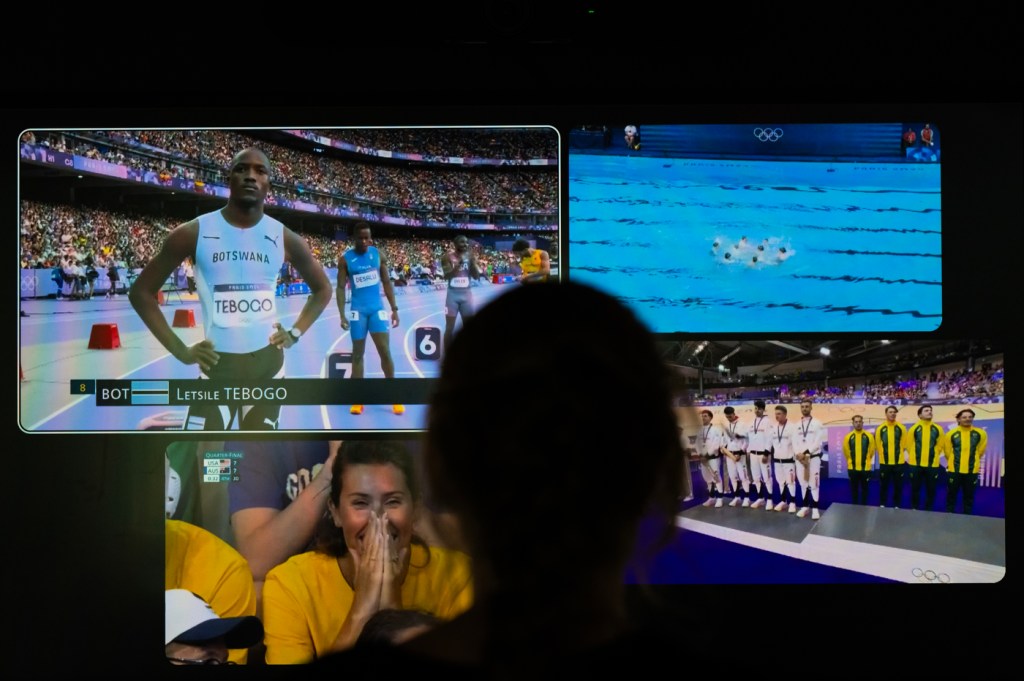
The Paris Olympics are winding down, and if you’re one of an estimated 34 million daily viewers in the U.S. alone, they’ve become something like a second job in the waning weeks of summer.
Maybe you’ve cheered on women’s rugby in the office. Become an expert on the gymnastics scoring system. Met elite dressage horses with Snoop Dogg and winced at “disastrous” (slightly splashy) synchronized dives.
However hard you’ve been watching these Olympics, though, Claire Dudley has been watching them harder.
Dudley, who completed a master’s degree in data science at Northeastern University in June, has spent the past three weeks hunkered down at a vast NBCUniversal broadcasting compound in Stamford, Connecticut, as a researcher for the company’s Paris coverage.
Working in 12-hour shifts, she’s part of a 40-person team keeping their eyes glued to their assigned sports — digging deep for statistics, personal stories and quick explanations of obscure rules to add important context to what fans are seeing on their screens. This is Dudley’s first time working the Olympics, and she’s on duty for field hockey, badminton, equestrian and modern pentathlon.
“We need to be able to find information quickly, basically,” she says, summing up the job. “Leading up to the Olympics, our role is to familiarize ourselves with our sports — we’re given materials on past winners, and we learn the rules. [Since] we got here, we’ve been working hand in hand with our statisticians and producers. We’re available 24/7 for any quick things they need.”
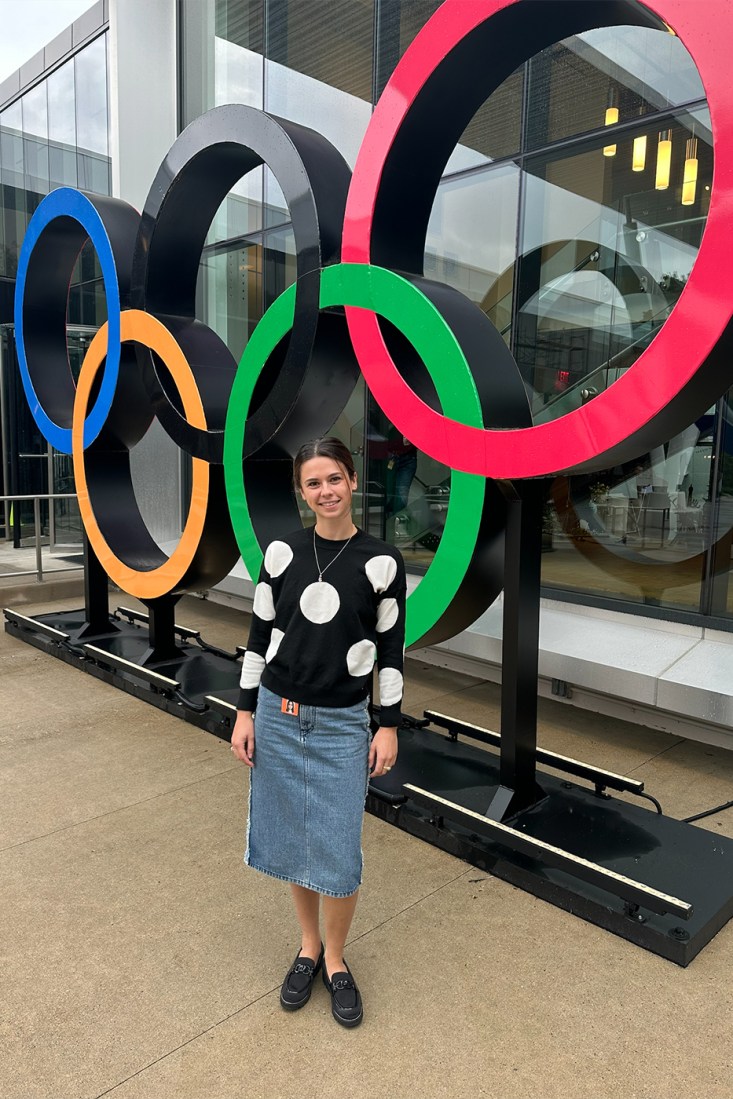
Jonathan Quartuccio, NBCUniversal’s senior director for research and editorial and Dudley’s supervisor for the Paris Games, describes the research room as “the brain trust for the operation at large.”
“We are sending out stories and context to the producers and studio teams for NBC, USA, Peacock,” he says. “Those same people are asking us a lot of questions, and it’s not just [Olympic broadcasts]. It’s the ‘Today’ show, it’s ‘Nightly News,’ it’s the sales and marketing departments.”
Dudley comes from a sports background — she played Division 1 hockey as an undergraduate and has had a fellowship as a statistical analyst for the NHL’s Boston Bruins since 2023. But the Olympics represents a world showcase for dozens of sports that operate in obscurity most of the time; for even the most seasoned, polymathic sports buff, the learning curve for Paris 2024 assignments would be steep.
“Obviously we’re not coming into it as experts on modern pentathlon,” Dudley laughs. “But you need those research skills to know exactly how to find reliable information.”
Equestrian — particularly dressage — has been her most foreign frontier. “Show jumping is pretty intuitive; they don’t want to hit the barriers. But dressage is …”
Even with weeks of round-the-clock observation under her belt, she grasps for a description. “… it’s a little bit like gymnastics. They’re supposed to be hitting [certain] moves correctly. It’s been funny, Snoop Dogg and Martha Stewart did a segment on it last night, so it’s cool that the world is getting more exposure to it alongside me.”
Dudley was keen to work in sports in some capacity following her college athletic career. As an undergrad, she double majored in psychology and statistics and worked as a data science intern for SMT, a sports media and tech company. At her Bruins fellowship, she produces data-driven scouting reports on the franchise’s minor league and developmental players to share with coaches and management.
That resume is a bit different than that of the typical TV network researcher, says Quartuccio, who is working on his sixth Olympics for NBC. “I personally like someone with a journalism background — usually those folks know how to write, they know what the story is,” he says. “But anyone who has a curious mind, a digging mentality and accuracy can be a good researcher. Claire has that attention to detail we’re looking for, and she gets the mission.”
Dudley honed those skills in her Northeastern master’s program. “My background is more in analytics and data science, and this experience is pretty different,” she says. “But the classes I took at Northeastern had a heavy research basis, where I was having to dig a lot of the time.”
For a course in unsupervised machine learning and data mining, for example, she did a group project on Boston traffic patterns that involved delving into disparate public records and figuring out how they all fit together.
“I think that skill has tied in pretty well, even though I’m dealing with very different information than a data science or modeling project,” she says.
For the Olympics, some sources are straightforward — Dudley can turn to governing bodies like the World Badminton Federation, or college statistics for certain athletes. At other times, the job requires a little more detective work, or relies on personal experience. Dudley played high school field hockey, for example, so she had a leg up on understanding the rules. When she couldn’t find a comprehensive list of college field hockey athletes at the Olympics, she had to craft one herself, hand-combing through rosters on university websites.
Obviously we’re not coming into it as experts on modern pentathlon. But you need those research skills to know exactly how to find reliable information.
Claire Dudley, 2024 masters of science graduate and researcher for the Paris 2024 Olympics
Earlier this week, the track and field broadcast team needed information about Wayde van Niekerk, a South African sprinter whose sister, Kayla Swarts, made her Olympic debut in field hockey in Paris. Dudley turned around stats on Swarts’ appearances and in-game statistics almost immediately, and the connection made it to prime time.
“This is someone I can trust,” Quartuccio says.
To the uninitiated, the research room can seem like chaos. But there’s a method to the madness, and Dudley has gotten used to its rhythms. She and all the other researchers have a “mirror” for their assigned sports — a colleague who works the same beat on the exact opposite schedule. Dudley starts her 12-hour shift at 1 p.m., just as the evening prime-time events in Paris are ramping up.
“I would get there some days and we’d have six badminton games on the same computer: mixed doubles, men’s doubles, women’s doubles,” she says. “There would be two field hockey games at the same time, and we’d be sharing TV screens with someone else who is doing fencing and diving. With gymnastics up on the big screen.”
Things calm down a few hours later, when Paris turns in for the night. The researchers use that time to prepare for the next day, recap highlights and field any requests from their producers and statisticians.
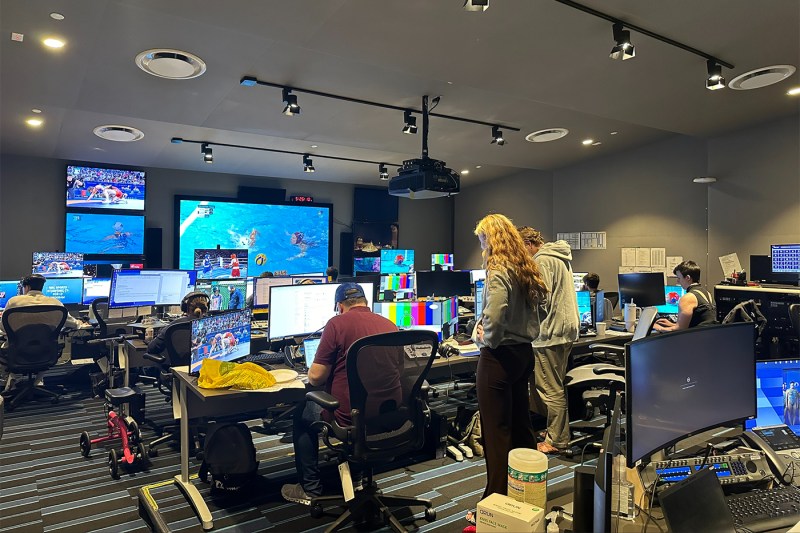
Though grueling, the job affords a more visceral, distilled version of the excitement typical viewers feel watching the Olympics from their couches. For one, researchers get the thrill of seeing the statistics, factoids and obscure rules they’ve unearthed go out to millions on NBC’s broadcasts. It happened for Dudley early on, when she was pulling data for the parade of nations during the opening ceremonies.
“I dug up that Papua New Guinea is the most linguistically diverse country in the world, with over 800 native languages,” she says. “And Peyton Manning pulled it out during the opening ceremony. I was excited about that.”
They become heavily invested in their respective corners of the Games and the athletes they follow a dozen hours a day, too. Dudley has been rooting hard for An Se Young, the Korean women’s singles gold medalist who dominated the badminton competition despite playing through injury. Another favorite has been Viktor Axelson, the Dutch badminton gold medalist who has become a force in a sport more celebrated in Asian countries.
“He’s been such a cool storyline,” Dudley says. “He taught himself Mandarin to communicate better within the badminton world, and he’s been a huge advocate for men’s mental health.”
After the Games, Dudley will return to her fellowship with the Bruins. But the chances of an Olympic return sound promising. Quartuccio says the studio operation in Stamford swells by about 130 freelancers during the Olympics; thanks to streaming and new hits like the continuous whip-around highlight show “Gold Zone,” it’s only getting bigger .
“I have two people just on medals,” he says, adding that Dudley has been an “awesome” addition to the team.
For her part, Dudley has enjoyed the camaraderie and collaborative atmosphere of the research room, which she says can get surprisingly boisterous for a workplace where everyone is glued to computers.
A highlight for the room was cheering on one of their own: During the women’s skeet shooting final, “Gold Zone” producers asked the sport’s assigned researcher to explain a puzzling ruling. He did such a good job they brought him on air.
“We were so excited for Benji, screaming,” she says. “It’s been really fun. I never thought I’d be doing it.”
Schuyler Velasco is the campus & community editor for Northeastern Global News. Email her at s.velasco@northeastern.edu. Follow her on X/Twitter @Schuyler_V.

